
Earlier this week, Milo Yiannapolous, an editor at the right-wing news platform Breitbart.com, had his widely coveted ‘blue tick’ removed from his Twitter account by the social media company, for violating ‘terms of service’ (ToS).
Conservative media has been up in arms about the episode, which has been framed as an attack on free speech.

Since then, Yiannapolous and various technology media outlets have also framed the incident as a free speech issue. Should Twitter aim to police speech? Was deverifying his Twitter account a sort of censorship, denying the elementary First Amendment right to freedom of expression?
Although it wasn’t immediately clear why Twitter took this measure — one tweet highlighted by media outlets was when Yiannapolous told another Twitter user:
You deserve to be harassed you social justice loser https://twitter.com/ComfortablySmug/status/678619481116188673 ...
— @nero
Yet few looked to investigate the context of the latest incident, or what had actually happened.
In a revealing tweet, Yiannopoulous railed at Ian Dunt, editor of Politics.co.uk, that his statement about deserving harassment was merely an “injoke between conservatives.”
@RupertMyers @IanDunt @JamesDelingpole Moronic Dunt doesn't realise that the 'deserve to be harassed' was an injoke between conservatives.
— @nero
Yiannopoulos also confirmed this to Re/code, explaining that the tweet was actually a “joke between friends.”
So who is the owner of the Twitter account Comfortably Smug, whom Yiannopoulous tweeted “deserved to be harassed,” as an in-joke between conservative friends?
Two conservatives sitting in a tree
In 2012, the account was identified by BuzzFeed as belonging to Shashank Tripathi, a Republican Party political consultant and former Wall Street hedge-fund analyst. He’d been outed for deliberately tweeting false and frightening reports of catastrophe when Hurricane Sandy hit New York, which “spread wildly on Twitter and onto news broadcasts.”
Tripathi was campaign manager of Christopher R. Wight, Republican candidate for the US House of Representatives from New York’s 12th Congressional District, and a “vocal supporter of Mitt Romney” among other Republican leaders.
After Tripathi was identified as the owner of the anonymous Comfortably Smug Twitter account, he apologized for spreading the false tweets and resigned from Wight’s campaign.
A review of tweets between Shashank Tripathi and Milo Yiannopoulos over the last year reveals an intriguing pattern.
Tweets from early last year show that Tripathi is, indeed, friends with Yiannopoulos, and that they share the same outlook and values.
In March, for instance, Yiannopoulos retweeted the following from Tripathi’s Comfortably Smug account:
If your girl is bugging you texting too much at night don't just reply. Wait 30 mins & send "Hes busy right now 😚"
— Comfortably Smug (@ComfortablySmug) March 21, 2015
Then turn the phone off
In April, Tripathi congratulated Yiannopoulos on meeting George W. Bush:
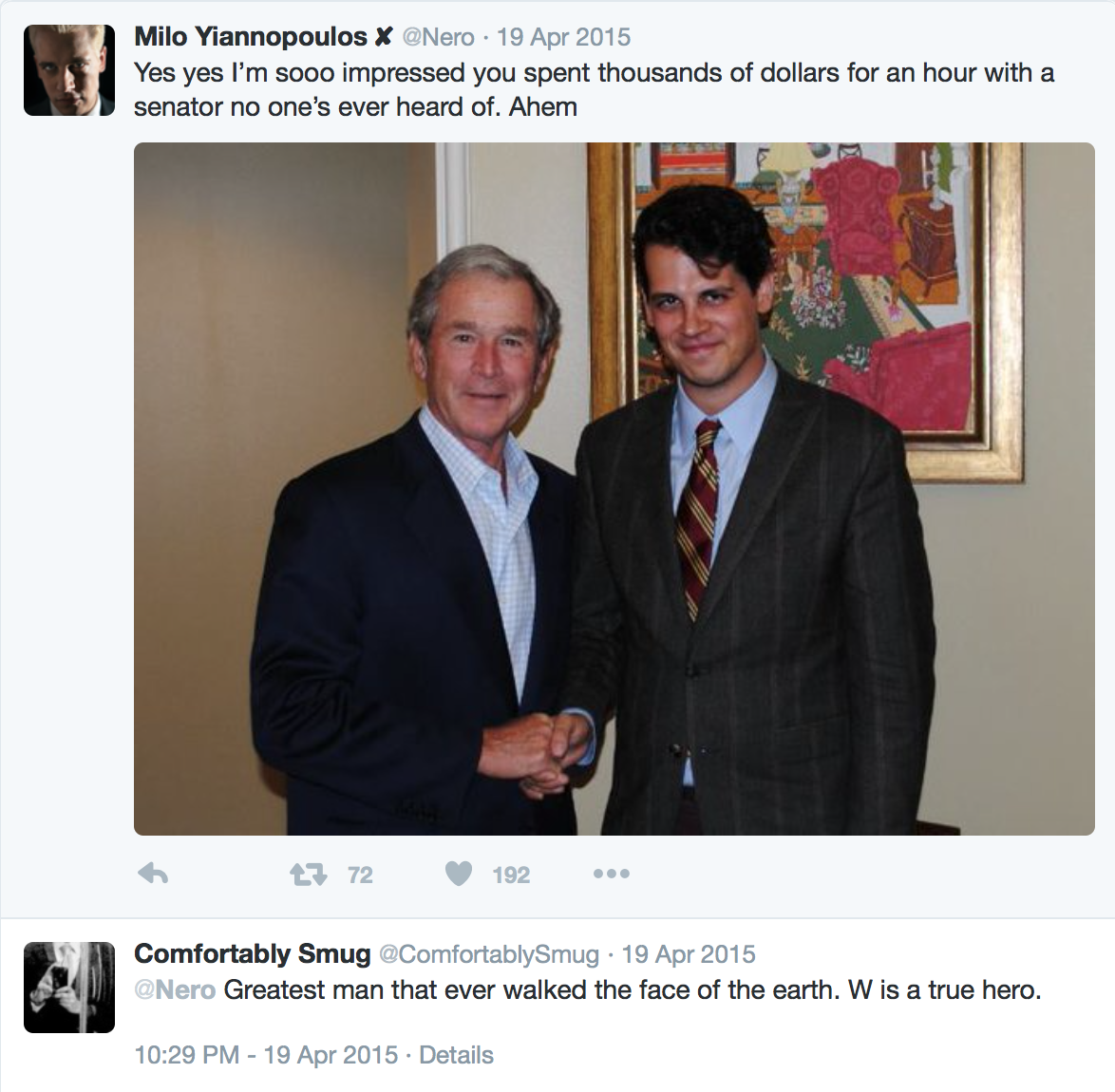
In June:

However, from July onwards, Tripathi began to increasingly masquerade as a critic of Yiannopoulos, a supporter of feminism and an opponent of #GamerGate.
Yiannopoulos would play along, resulting in a flurry of Yiannopoulous followers emerging to troll Comfortably Smug with inflammatory tweets, believing him to be a real critic of their idol.
Tripathi would continue to play along, demanding that Yiannopoulos apologize. In turn, instead of revealing that Comfortably Smug is in fact a fellow conservative friend of his, Yiannopoulos would also play along, allowing his followers to believe Comfortably Smug is a genuine critic, while criticizing him as an example of the ridiculous nature of his critics’ claims.
Here are some examples:
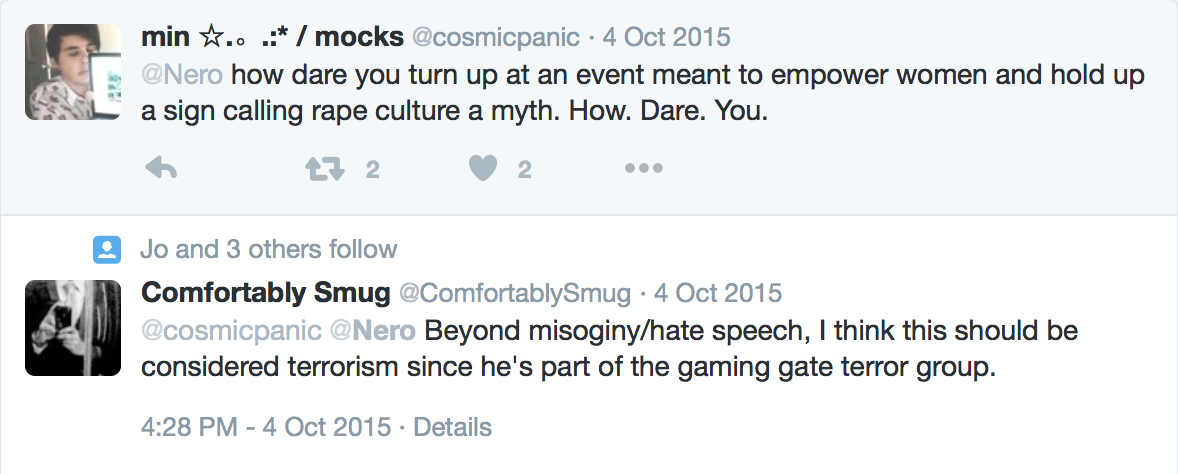
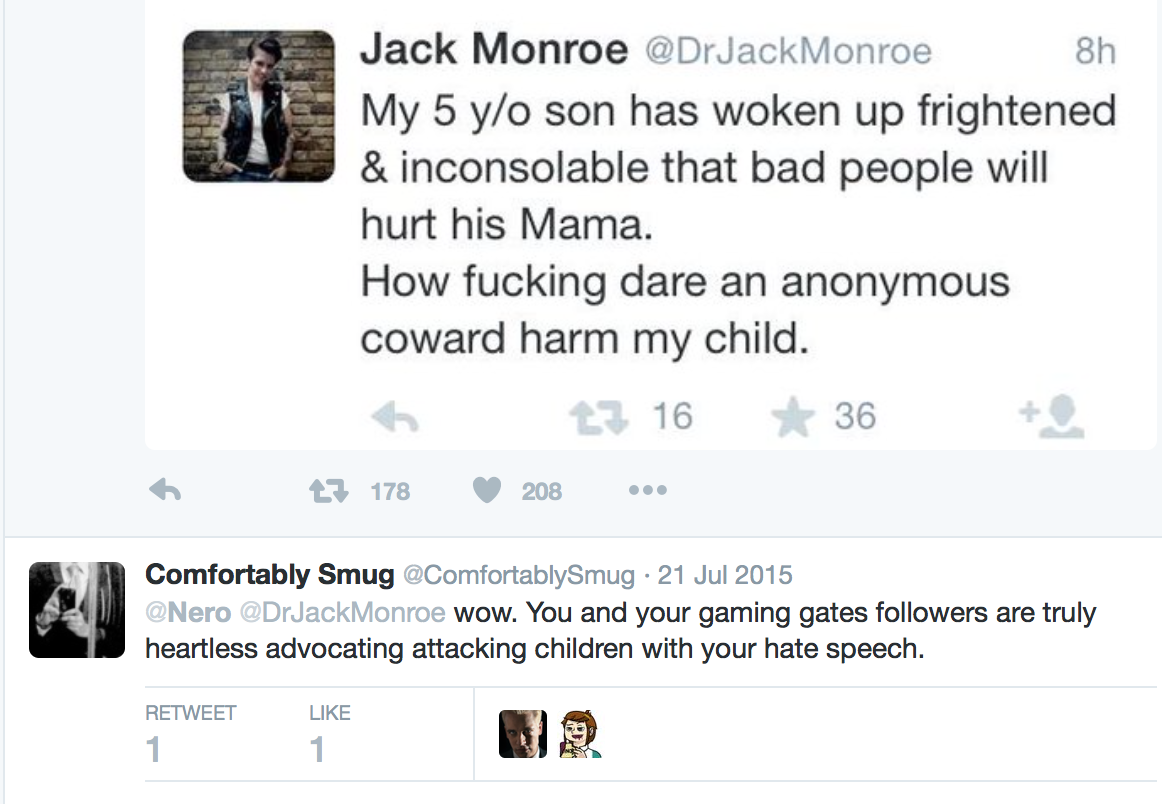
In one instance, Tripathi’s feigned criticisms of Yiannopoulos elicited the following avalanche of responses (this is just a sample):

The rationale for this bizarre game of mutual Twitter trolling was summed up nicely here:

In other words, the faux tug of war between Tripathi’s Comfortably Smug and Yiannopoulos’ @nero works well to increase Yiannopoulos’ Twitter reach.
#JeSuisMilo — self-manufacturing ‘free speech’ martyrdom
Last month, shortly before Yiannopoulos’s ‘blue tick’ was removed from his account, Tripathi and Yiannopoulos used this charade to good effect in the following exchange:

As the rest of the thread illustrates, when Yiannopoulos followers discovered Comfortably Smug’s real identity, linking to the BuzzFeed piece among others, Yiannopoulos and Tripathi simply continued the charade:

Yiannopoulos then went on to use the charade to smear what he calls “SJWs”, an internet pejorative referring to “Social Justice Warriors”, people who:
“… believe in an extreme left-wing ideology that combines feminism, progressivism, and political correctness into a totalitarian system that attempts to censor speech and promote fringe lifestyles while actively discriminating against men, particularly white men.”
That includes, basically, anyone who thinks the banks are out of control; supports gender equality; recognizes that despite much progress women and ethnic minorities are still marginalized compared to white males across key institutions; and is increasingly concerned by far-right neo-Nazi sympathisers whose power is rising on the back of political and economic uncertainty.
Linking to the BuzzFeed piece on Yiannopoulos’ friend Triparthi’s Twitter antics during Hurricane Sandy, a follower tweeted:
Goes to show, all SJWs are horrible people covering for something they're ashamed of @mecha_zawa @biofgg @comfortablysmug @nero
— @ibbibby
In response, Comfortably Smug repeatedly demanded that Yiannopoulos be blocked and banned from Twitter, and asked others to report him:
@Bernstein @Nero Block and report Milo for harassment. No good comes from engaging him and his mindless hordes of misogynists
— Comfortably Smug (@ComfortablySmug) December 29, 2015
The tweets between Yiannopoulos and his friend Tripathi appear to have been deliberately designed to drum up a perception of Yiannopoulos being beseiged by terrible “SJW” demands to get Twitter to “censor” him.
But Yiannopolous’ framing of this episode as a matter of ‘free speech’ is disingenuous. The cat and mouse game of fake Twitter trolling Yiannopolous invented with his friend Tripathi is not the issue.
Breitbart.com’s troll-in-residence
The issue is Yiannapolous’ systematic use of his Twitter account to engage in derogatory and often highly personalized attacks on women he disagrees with — in the process, drumming up his army of online acolytes to harass those women incessantly with targeted messages of hate, violence, threats, and sexualized comments.
When, for instance, writer Holly Wood wrote a piece critiquing an essay by tech entrepreneur Paul Graham lauding inequality, Yiannopoulos posted what passes at Breitbart.com for a BREAKING NEWS story, titled ‘Social Justice Warrior Knives Out for Startup Guru Paul Graham.’
The piece didn’t identify Wood by name, but mentioned her as a Twitter user, quoted her article headline, and her Twitter bio — making her identification a simple Twitter/Google search away:

The Breitbart piece was also tweeted out by tech entrepreneur Vivek Wadhwa, who apparently sees himself as the “voice for women” in Silicon Valley. Wood took Wadhwa to task on Twitter for sharing Yiannopoulos’ Breitbart piece, despite professing support for gender equality in technology.
Despite receiving a truly pathetic 893 shares on Facebook (as of writing), the subtle identification of Holly Wood by Breitbart.com triggered a barrage of Twitter trolling from Breitbart readers and Yiannopoulos followers.
Yiannopoulos and his friend British ex-Tory MP Louise Mensch further took to Twitter to inform their followers that Wood was “harassing” Wadhwa.
And so ensued an escalating onslaught of Twitter trolling insanity fuelled by Yiannopoulos’ followers. “I received massive hate in my mentions,” said Wood.
“Just non stop being called a cunt. Told I need to shut up. Called a bigoted racist because I say things like white men are in power. I had to install four different block softwares, blocking hundreds of thousands of twitter users to stop it.”
Here is a minuscule (relative to the volume) sample of tweets received by Wood, which also mentioned Yiannopoulos’ Twitter handle, @nero which gives a flavour of the sort of language, hostility and threats that Yiannopoulos regularly witnesses on Twitter as a consequence of his tweets:























Imagine receiving hundreds of thousands of such tweets, simply for engaging in public discourse by writing articles critical of public figures, and then engaging directly with those public figures on Twitter. According to Yiannopoulos, the latter constitutes “harassment” — but the crazed trolling showcased above is perfectly legitimate ‘free speech’, that must not be ‘censored.’
The upshot is pretty simple:
Milo Yiannopoulos and his far-right support base want the ‘freedom’ to troll women online by telling, showing or insinuating that they deserve to be fucked, raped or hurt.
And he wants these women to accept that this by no means constitutes harassment — just some patriotic white guys doing the right thing to protect journalistic ethics against SJW hordes taking over America, and the world.
By deverifying Yiannopoulos, Twitter has not censored him, but merely demoted his online status to what he, in fact, is: a professional troll, who quite literally makes a living by manufacturing stories based on trolling.
Protecting GamerGate’s child rape fantasists
Yiannopoulos, for instance, produced an ‘exclusive’ purportedly proving that GamerGate critic Sarah Nyberg “is a pedophile.” He has remained strangely silent, though, about the fact that 8chan.co, the central hive of GamerGate, is an active pedophile network. As Daily Dot reports:
“On numerous public forums, 8chan users share graphic images of children, plus links to hardcore child pornography. No content is hidden. Thousands of posts are accessible within two clicks of the homepage.”
Numerous 8chan forums, reportedly populated mostly by conservatives, are:
“… filled with radically sexualized images of little girls and boys. Alongside photos of children in varying states of undress, guided into Playboy-model poses by unseen older hands, user-submitted stories chronicle their interactions with children… On 8chan’s pedophile forums, users insult and dismiss most anyone who might object to the content they’re sharing, calling them ‘moralfags.’
“Moralfags, the thinking goes, are not worth listening to because the self-described pedophiles, hebephiles, and ephebophiles (each word specifies the age of children that an adult is sexually attracted to) who populate these forums have heard ‘moralfag arguments’ a million times already. No amount of indignant Internet posting, they reason, changes the fact that they’re attracted to children, or that they want to look at sexualized images of them. So ignoring or berating the inevitable crusaders is the only retort they have.
“Several 8chan forums feature children as young as toddlers dressed in swimsuits or thongs and posed suggestively. If this isn’t outright illegal hardcore child pornography, it’s walking up to the line of the law and spitting over it with a smirk.”
But Yiannopoulos is not interested in investigating or exposing the organized child rape fantasies hosted by GamerGate’s online communities — he’d much rather go after Sarah Nyberg, a critic of GamerGate.
This sort of ludicrous double standard is what Breitbart.com calls ‘journalism.’
Rape? What rape?
The sad phenomenon of Yiannopoulos’ ‘journalism’ is a disturbing symptom of a deepening social problem: a crisis of masculinity.
Yiannopoulos’ other crusade, for instance, is to lampoon ‘feminists’ and ‘SJWs’ who believe in the idea of a “rape crisis.”
Here’s an example of Yiannopoulos’ efforts in this regard — and the level of journalistic integrity involved.
In one October 2015 Breitbart piece, he describes himself as:
“… relentlessly critical of hysterical, fact-free narratives about an American rape epidemic (which is just wrong), the idea that society supports rapists (also wrong, we put them in jail) and the notion that somehow western culture subtly encourages others to become rapists, sexist, and misogynists (hilariously wrong).”
Apart from the infantile straw-man language, consider the first link Yiannopoulos provides to prove that there is no such thing as what he calls “an American rape epidemic.”
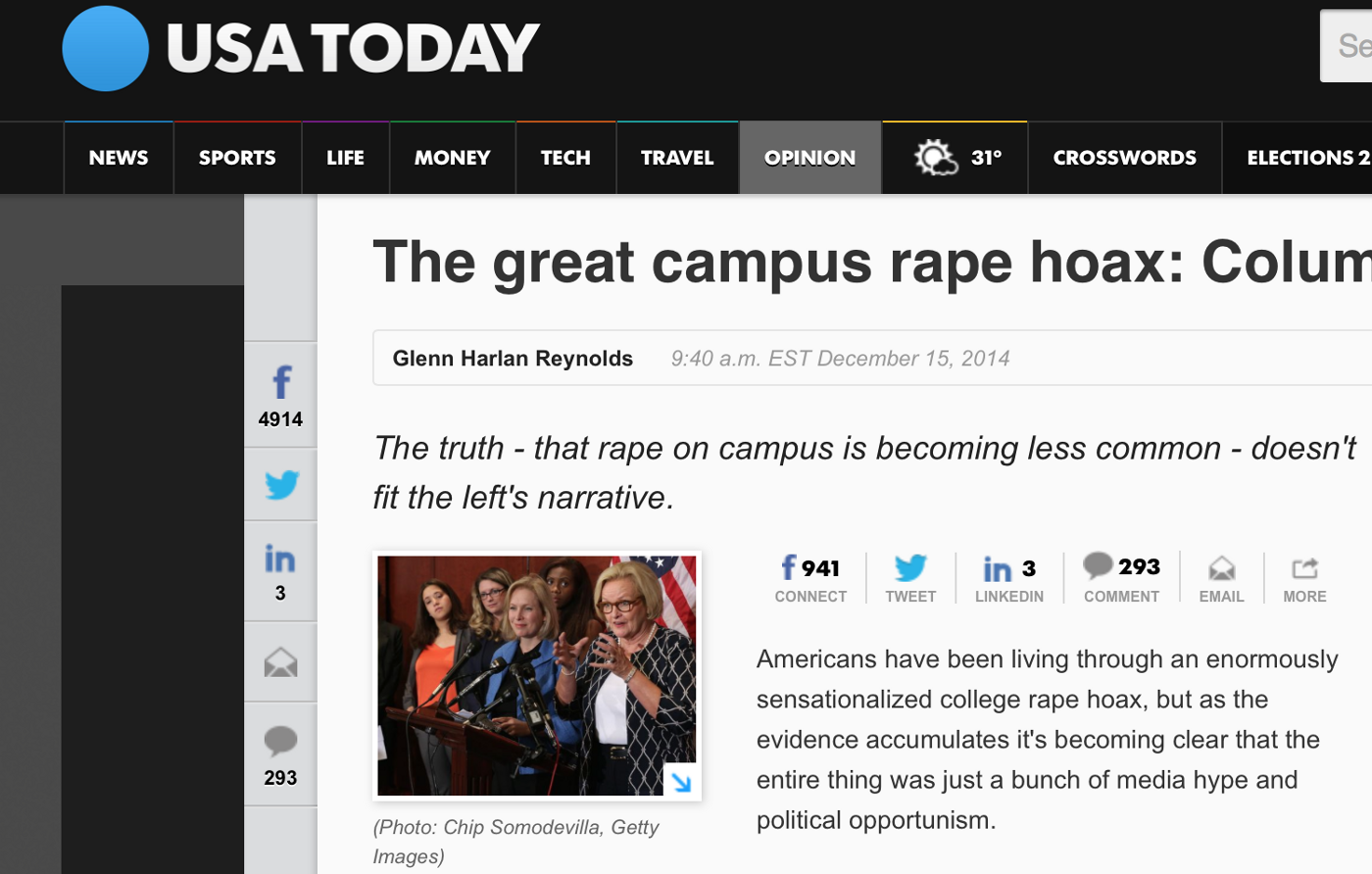
This year-old piece, by an American law professor, Glenn Harlan Reynolds, is an enlightening study in the art of anti-science bullshit mongering.
Reynolds refers to a 2014 study by the US Justice Department’s Bureau of Justice Statistics to discredit the oft-cited ‘1-in-5’ women are sexually assaulted statistic. The study proves, he says, that “the rate of rape and sexual assault is lower for college students (at 6.1 per 1,000) than for non-students (7.6 per 1,000). (Note: not 1 in 5). What’s more, between 1997 and 2013, rape against women dropped by about 50%, in keeping with a more general drop in violent crime nationally.”
While the Bureau of Justice Statistics report is an important contribution to the literature, it remains quite problematic.
Firstly, Reynold’s refutation of the claim that sexual violence against women is rising, by showing that it’s falling, is disingenuous. Everyone knows that in the US, the rates have fallen over the last few decades, and that this is progress.
According to the Rape, Abuse and Incest National Network (RAINN), which points out that an American is sexually assaulted every two minutes (if that’s not an epidemic, what is?):
“Sexual assault has fallen by more than 50% in recent years. Had the 1993 rate held steady, about 9.7 million Americans would have been assaulted in the last 20 years. Thanks to the decline, the actual number of victims was about 4.2 million. In other words, if not for the progress we’ve made in the last 20 years, an additional 5.5 million Americans would have become victims of sexual violence. While we should be happy that we’re making progress, we are still a very long way from solving this problem.”
The other problem, though, is that the DoJ Bureau of Justice Statistics report is based on flawed data. The report uses the National Crime Victimization Survey (NCVS), which has been found to be problematic for assessing rates of rape and sexual violence.
According to the National Research Council’s Committee on National Statistics, in its study, Estimating the Incidence of Rape and Sexual Assault (The National Academies Press, 2014), the “basic goal and design” of the NCVS “create problems for measuring rape and sexual assault”:
“Based on the potential errors in the NCVS discussed in Chapters 7 and 8 and summarized above, the panel identified four major obstacles for accurately estimating incidences of rape and sexual assault.
1. a sample design that is inefficient for measuring these low-incidence events,
2. the context of ‘crime’ that defines the survey,
3. a lack of privacy for respondents in completing the survey, and
4. the use of words with ambiguous meaning for key measures in the questionnaire.”
Perhaps the biggest limitation of the NCVS data, though, is that its figures are limited to experiences within a respondent’s last six months, rather than the full duration of the respondent’s university attendance.
Reynolds also criticises the ‘1-in-5’ figure for being based on a single study that surveyed only two college campuses, whose authors admit cannot be generalised as a nationally representative statistic.
Boom!… Except that last oft-cited study is not the only one backing such a high estimate. It has, however, been singularly lambasted by writers like Reynolds because it was referred to by President Obama and the White House.
The problem for Reynolds, and Yiannopoulos who hyperlinks him so faithfully, is that the study referenced by Obama is only one of many studies demonstrating alarming levels of sexual assault and violence against women on US campuses.
Here’s one early study from 1987:
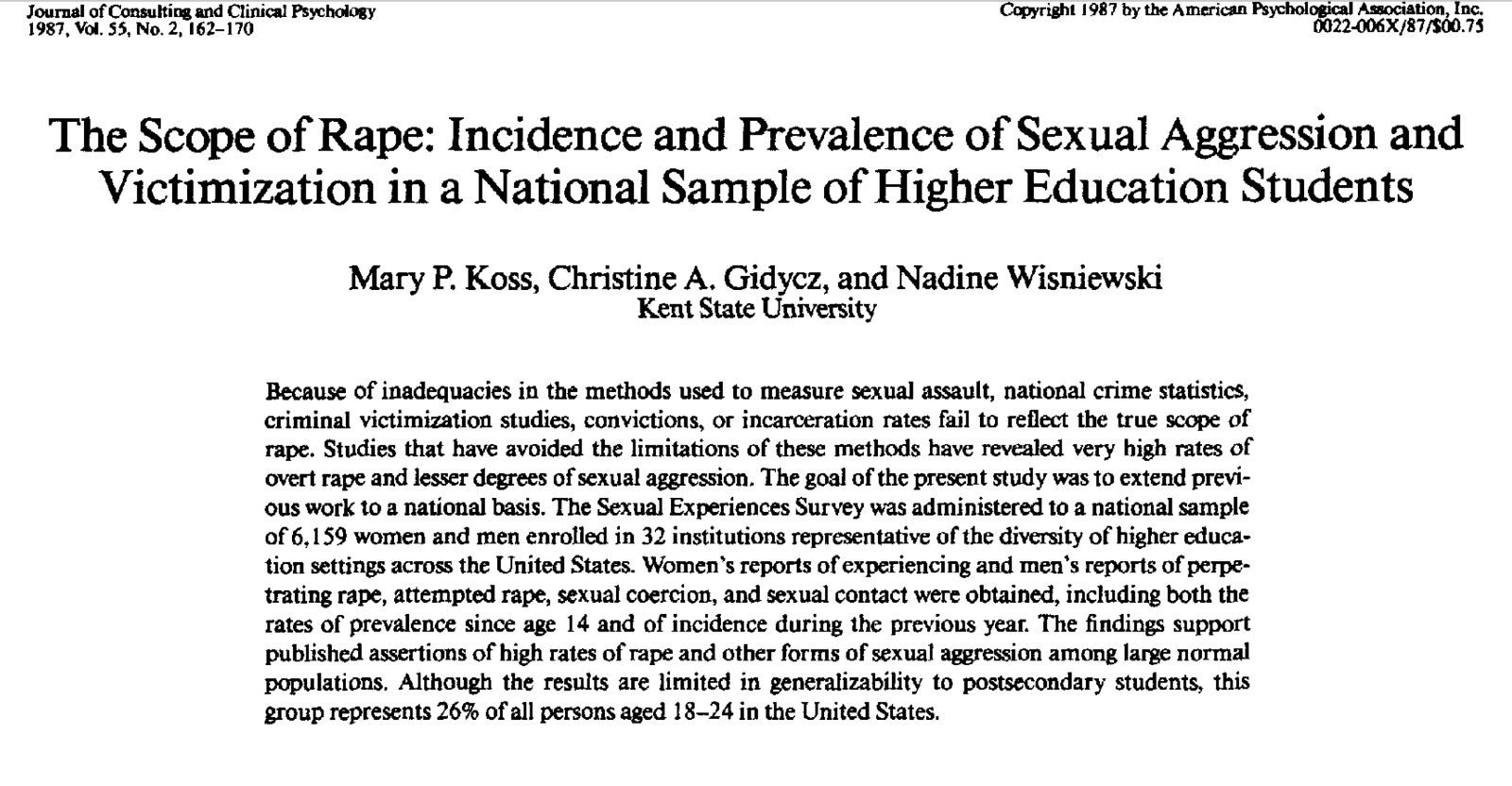

At 27.5%, that means that decades ago, the 1-in-5 figure was all too real. Even while rates of sexual violence have fallen overall since then, this figure seems to have remained fairly constant at universities.
In 2011, Knowledge Networks, a US polling agency which conducts nationally representative surveys (it’s now part of the Society for Consumer Research [GfK], Germany’s largest market research organization), was commissioned to study college dating and abuse by Liz Clairborne Inc.
Liz Clairborne Inc., now known as Fifth & Pacific Inc., is the first company founded by a woman to make the Fortune 500 list (it did so in 1986 with retail sales of $1.2 billion).
The 2011 survey was based on a random sample derived from a 50,000-strong pool of respondents “statistically representative of the entire US population.” The sample was then further weighted using “Census Bureau school enrollment benchmarks” to “accurately represent all 18-29 year-old students enrolled in a four year college or university.”
Here are some of the findings:

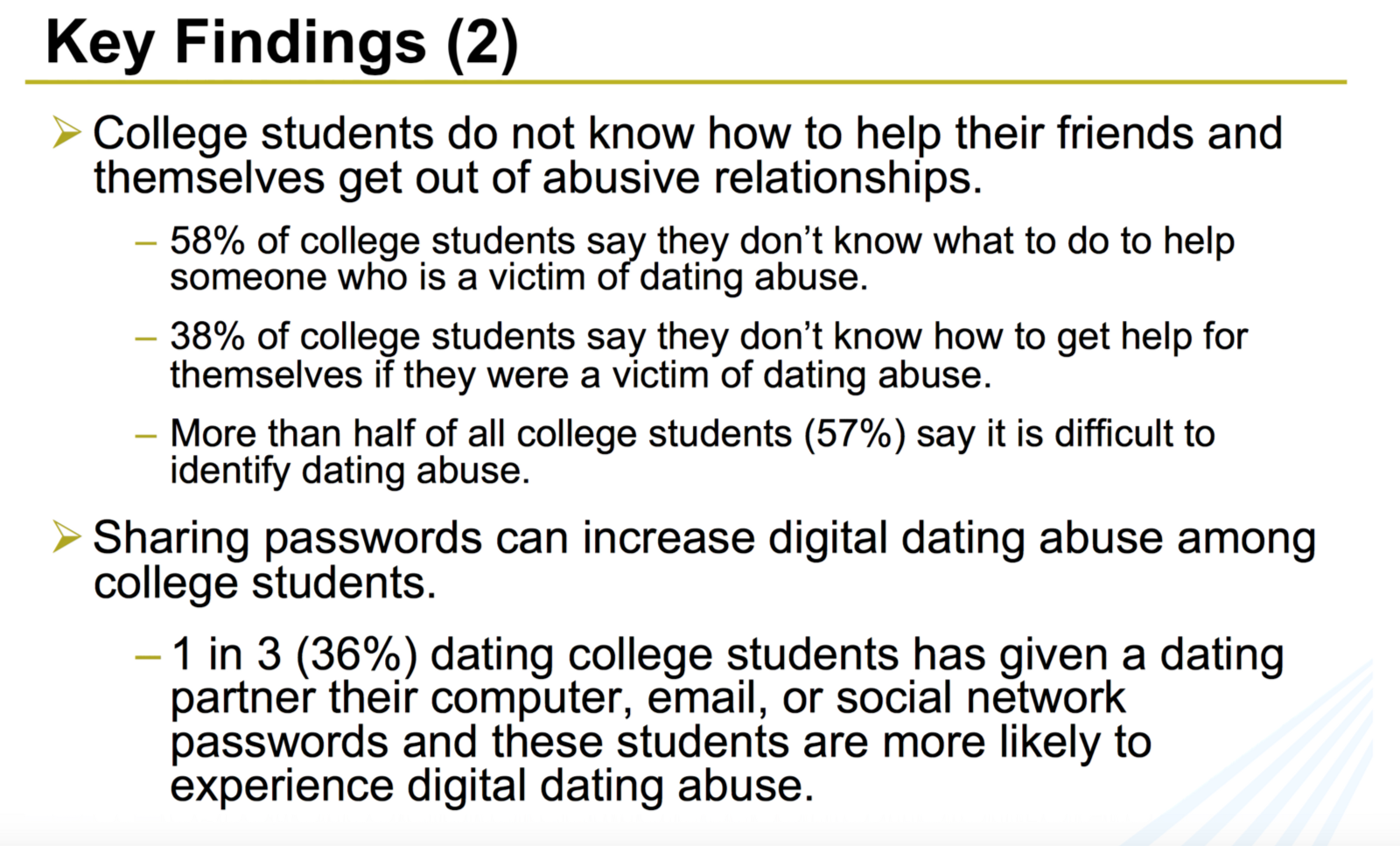
And of course, there’s the well-known September 2015 study by the American Association of Universities, one of the largest ever conducted on sexual misconduct, which found that 23% of female US college students (that’s nearly 1-in-5) had experienced some form of unwanted sexual contact, encompassing kissing, touching or rape. Nearly 11% (that’s 1-in-10) stated that the unwanted contact included penetration or oral sex.
Consider that Yiannopoulos’ response to this sort of robust, ongoing social science research — pointing consistently to extraordinarily high levels of rape and sexual assault, especially against women — is to simply pretend it doesn’t exist; while then smearing anyone, but especially women, who write and campaign about this problem.
It’s not just the US. Last year, The Telegraph commissioned YouthSight, a specialist research group, to carry out a poll of British university students. The poll found that a third of female students in the UK had experienced sexual assault or abuse:
“It found that 31 per cent of female students polled said they had been the victim of ‘inappropriate touching or groping’ and around one in 20 had experienced more intimate but unwelcome advances or been pressurised into sexual activity. Overall 34 per cent indicated they had experienced some form of assault or abuse.”
According to a series of studies published in The Lancet (the prestigious British medical journal not really known for its promotion of Feminist SWJ Far Left Cultural Marxism), violence against women and girls has become:
“… a global public health and clinical problem of epidemic proportions.”
According to the World Health Organization, a whopping 35% of women worldwide have experienced physical or sexual violence, mostly from an intimate partner.
What this means is that violence against women is a global phenomenon, a seamless continuum of structural misogyny that transcends different cultures, nationalities, ethnicities, and faiths.
This shows that the convenient far-right mythology that violence against women is only a problem ‘Out There’ perpetrated by ‘Them’ foreigners is little more than a figleaf to justify a very real epidemic of sexual violence against women in the US and UK, perpetrated by American and British men.
The common denominator here, as uncomfortable as it may appear, is the complicity of one gender: men.
The US, the UK and the world is facing a global crisis of masculinity.
Within the US, it is a crisis that, judging by the nexus of vested interests that coalesce in a publication like Breitbart.com, is co-extensive with the sort of ‘free market’ extremism that created the 2008 banking collapse; an obsession with wanton fossil fuel dependence; hostility to science, manifest especially in climate science denialism; hatred of immigrants, foreigners, women and Muslims; endless oil wars in the Middle East and beyond; and the fetishization of mass surveillance and draconian anti-terror powers.
Men — white or black or brown or pink or whatever — need to wake up to our responsibility in perpetuating power structures that normalize systematic violence against women, and a whole host of related forms of violence against people and planet.
Otherwise we’ll end up laughing and harassing our way to an uninhabitable dystopian global hell-hole.
This piece was amended on 15th January 2016 to correct a citation of a Tweet that should have been attributed to one of Milo Yiannopoulos’ followers.






